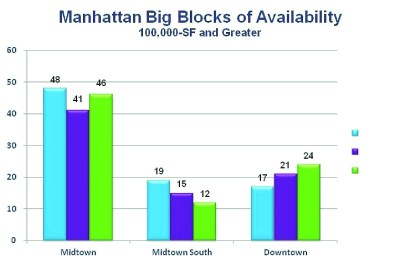The number of Manhattan buildings with at least 100,000 square feet of (potential) availability (contiguous or noncontiguous) has climbed over the past year to 82 from 77, though it is down from 84 two years ago. The figures quoted are a catch-all including space currently vacant, known to have a tenant moving out or that is new construction with a completion date.
 As one can see from the accompanying chart, Midtown has seen the biggest rise over the past year. This is due to a couple of properties added to the “under construction/expected-soon category”—250 West 55th Street (which is officially back on that list after it was technically considered “postponed” a year ago) and 1045 Avenue of the Americas (which is on the cusp of a construction start).
As one can see from the accompanying chart, Midtown has seen the biggest rise over the past year. This is due to a couple of properties added to the “under construction/expected-soon category”—250 West 55th Street (which is officially back on that list after it was technically considered “postponed” a year ago) and 1045 Avenue of the Americas (which is on the cusp of a construction start).
Hudson Yards (Related) and Manhattan West (Brookfield) have yet to technically make our list because of the indecisiveness on the timing of these projects. Other Midtown additions include 4 Times Square, where there could be some 700,000 square feet available when Condé Nast vacates in 2014, and 114 West 47th Street, where Bank of America will be giving up approximately 300,000 square feet at its lease expiration in 2014.
Despite new construction underway in Midtown South (51 Astor Place with the entire 430,000 square feet available), this hot submarket has seen its big blocks of availability ease substantially, falling to 12 today from 19 just two years ago.
Downtown has seen the opposite effect, with its large blocks rising to 24 from 17 two years ago. Included in the new numbers are 2 and 4 World Financial Center, where it was expected though not assured as recently as a year ago that BofA/Merrill Lynch would be giving up substantial space. Today, those super blocks are first and third (by size) on the total Manhattan list with only 1 World Trade Center separating the two.
In the near-term, don’t be surprised to see a few additions in Midtown and Midtown South (new construction and tenants giving up space) before the numbers start to ease on a further improving economy later in the year.
Robert Sammons, Cassidy Turley

![Spanish-language social distancing safety sticker on a concrete footpath stating 'Espere aquí' [Wait here]](https://commercialobserver.com/wp-content/uploads/sites/3/2026/02/footprints-RF-GettyImages-1291244648-WEB.jpg?quality=80&w=355&h=285&crop=1)

